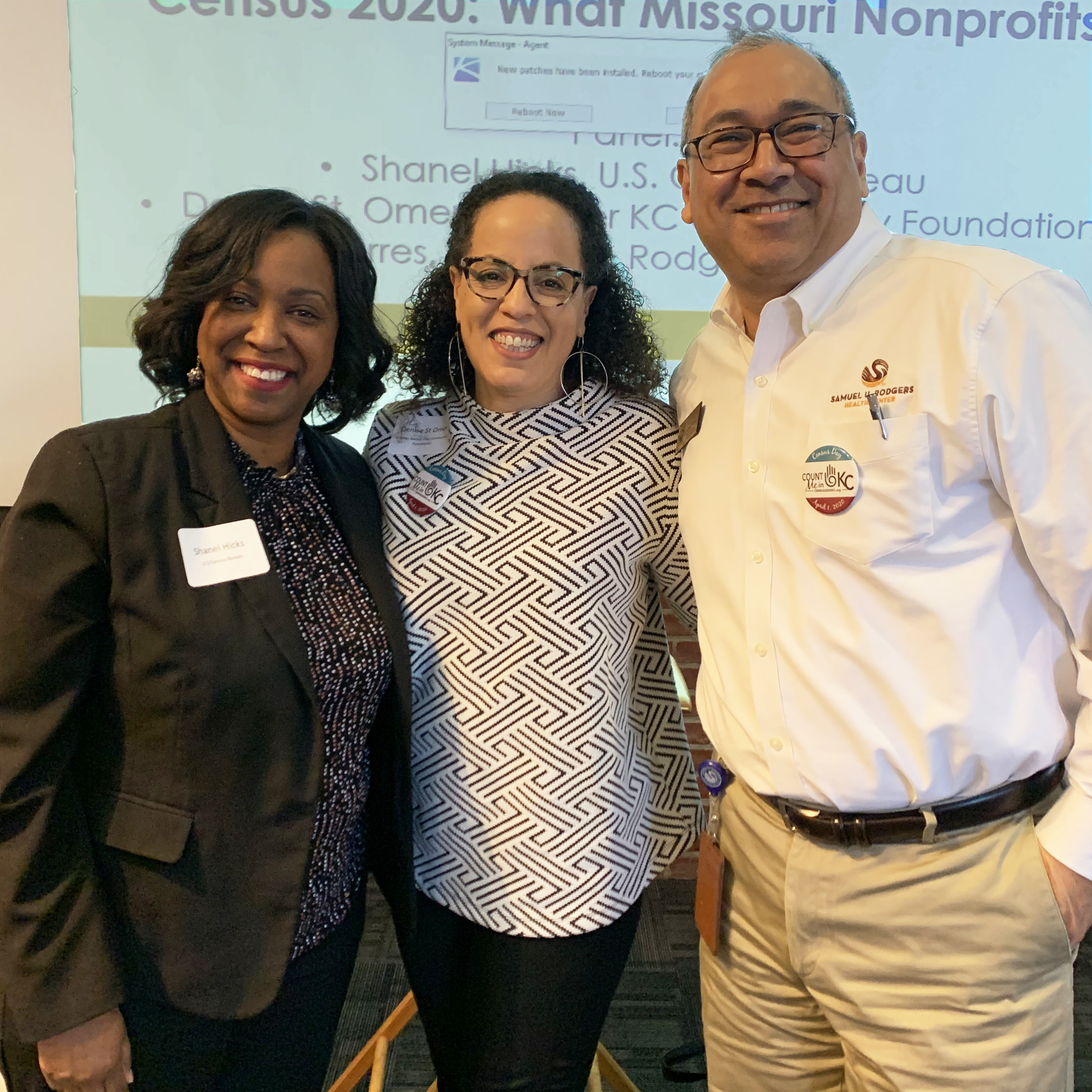Census 2020: Why It Matters to Kansas City Nonprofits

Update 9/7/2020 - You’ve heard the news that Kansas City is behind compared to 10 years ago in getting census forms completed for hard-to-count parts of our metro, and the self-response phase ends at the end of this month. Nonprofits know how much we stand to lose as a region if all of our residents are not counted. The Census Bureau is working with Mid-America Regional Council and community-based organizations to deploy resources to sites where response rates have been lowest. Learn more.
Nonprofit Connect hosted a panel on Tuesday, March 3 on what nonprofits need to know about the 2020 Census. Kicking off on April 1, an accurate count in the census will be especially important for the nonprofit sector.
Panelists included Shanel Hicks, Partnership and Data Services with the U.S. Census Bureau, Denise St. Omer, VP of Grantmaking and Inclusion Initiatives at the Greater Kansas City Community Foundation, and Jim Torres, Program Manager at Samuel U. Rodgers Health Center. Luann Feehan, President & CEO of Nonprofit Connect, moderated the panel.
We’ve compiled the answers from the panelists, along with resources, to provide a case for nonprofits to take action on the 2020 Census.
Why does the census matter to Kansas City nonprofits?
Jim: Census data determines the allocation of over $675 billion in federal funding. My organization receives federal funding to help us do things like keep lights on, so we can continue to provide community services.
Denise: Support for things like subsidized child care, free and reduced school lunches, violence prevention programs, is all controlled by the census.
Jim: All community services are impacted by the census count. And all individuals use the services in our community. Whether you’re a citizen or undocumented, you use the schools, the road, etc. That’s why everyone, not just citizens, needs to be counted.
Denise: Even if people aren’t counted, they will still have needs. If the funding that is allocated to Kansas City isn’t enough for the population, people will turn to nonprofits to fill that gap. Even if your organization doesn’t receive federal dollars, the demand for your safety net services will be greater. There is a tremendous ripple effect for all of us.
Luann: Ultimately, the census is a form of fundraising. Remember that the count affects our funding, and helps us get more funds in our community.
What is at stake?
Shanel: The census is only held every ten years. The last time we held a census in 2010, Missouri was reportedly undercounted. We actually lost a seat in the U.S. House of Representatives. And because of that, local governments and community developments lost money.
Jim: I understand that as nonprofit professionals we have so much to do. We have so much else going on. But we have one shot. If nonprofits don’t work to make sure everyone is counted, we will pay the price for the next ten years.
Luann: According to our recently released Kansas City Nonprofit Impact Report, only 4% of local nonprofit income is government grants, compared to 31% nationally. Kansas City is actually below the national average when it comes to federal funding. We need to change that.
Census officials are looking to nonprofits to help reach “hard-to-count” populations. How are nonprofits uniquely positioned to help?
Jim: This census will be so much tougher than ten years ago. With the current political climate, and fear from communities of color and immigrants, there is suspicion of providing information to the government. Mailed information and TV commercials won’t alleviate those fears. Nonprofits are the messengers who can communicate this information and have those conversations. You are the trusted voice in these communities.
It’s important to communicate to clients that the information they provide on the census is confidential and protected by federal law. The Census Bureau cannot share any of your personal information with the government or law enforcement, except for statistical purposes. There is no citizenship or immigration status question. (Read Nonprofit Connect’s policy update on the citizenship question from last summer.)
People in hard-to-count communities often have a lot going on in their lives. It’s up to the nonprofits they work with to remind them about the census.
Denise: Most people in nonprofit work are here to help others. Remember that the communities that don’t get funding based on an undercount are going to suffer.
What can Kansas City nonprofits do?
Shanel: Targeted messaging is so important for historically hard-to-count populations. Nonprofits should use census messaging that is specific to their clients. Meet clients where they are, like on social media. Reach out to the Census Bureau, because we do meetings.
Jim: Start by educating your staff. Then incorporate the census in information you are already providing your clients. We run Count Me in KC videos at our clinics, and have a tables set up with educational materials. Put an insert in the handout you are already using.
Denise: You don’t have to recreate the wheel, because you’re already working with these populations. Consider translating census materials into the language that your clients speak. We are counting on nonprofits to be the resource.
Shanel: The Census is available in English and Spanish, and we provide language guides for 59 other languages. We are also setting up Census Centers in areas with hard-to-count populations, staffed by census workers who are there to help.
Just remember that you cannot help someone actually click through the questionnaire unless you are a sworn-in census employee. You can only provide them with information prior to the questionnaire.
Where can nonprofits find resources?
Jim: Samuel U. Rodgers uses the videos and resources from Count Me in KC, the local census campaign.
Shanel: You can also find the direct link to census jobs on the Count Me in KC website, if the individuals and families you serve are looking for employment. We are still hiring!
Denise: The Metro Kansas City Census Equity Fund is still accepting requests for funding through May. This provides funding for your organization to promote census participation in hard-to-count populations. We review the requests monthly.
Jenny Garmon, Kansas City Public Library: The library is able to bring laptops and a mobile hotspot to nonprofit organizations so that their clients can participate in the census at a location that is familiar and comfortable to them. Contact Jenny Garmon at jennygarmon@kclibrary.org or 816-701-3732 for more information.
________________________
Nonprofit Connect believes it’s important for every individual in our community is counted. Find Census 2020 resources for nonprofit organizations on our Advocacy page.
Stay Up to Date
Get Nonprofit Connect's new blog posts and latest insights in your inbox. Subscribe to The Link weekly email newsletter.

